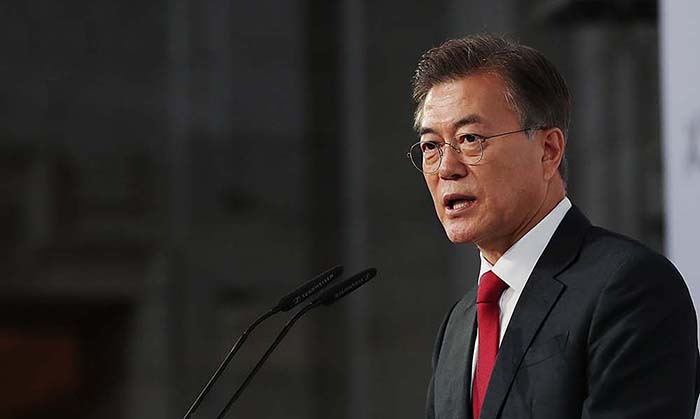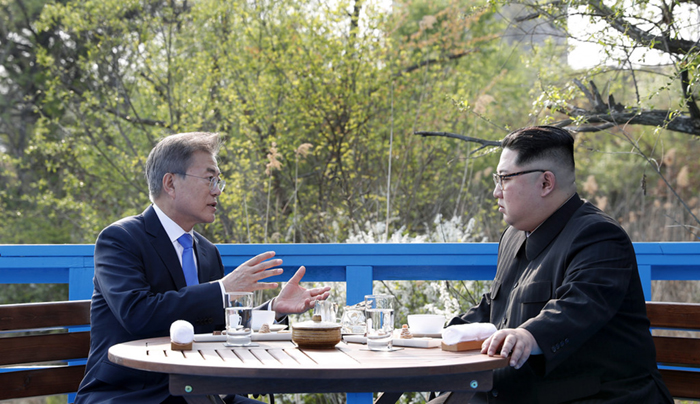News
Moon’s bold imagination brings peace to Korean Peninsula: Cheong Wa Dae
Jul 06,2018
President Moon Jae-in announces his administration's peace initiatives, at Berlin's Old City Hall in July 2017. (Cheong Wa Dae)
By Kim Young Shin
Exactly one year ago, President Moon Jae-in announced the Berlin Initiative that outlines his administration’s North Korea policies to dissolve the Cold War structure and to establish lasting peace on the Korean Peninsula, at Berlin's Old City Hall during his visit to Germany.
“We already know the road that leads to a peaceful Korean Peninsula,” said President Moon. “My administration will take a leading role in embarking on the dauntless journey toward establishing a regime of peace on the Korean Peninsula."
At that time, there was skepticism about the possibility of its realization, as the military tension in the region was high due to continued missile threats from the North and sanctions from the international community.
However, a year has passed now. North Korean athletes participated in the PyeongChang 2018 Winter Games. Two inter-Korean summits have been held, and a North Korea-U.S. summit was held, too. Discussions on settling peace on the Korean Peninsula have proceeded in a timely manner, realizing Moon’s visions, one by one.
On June 6 Cheong Wa Dae said, “The Moon administration won over North Korea and the international community by presenting consistent messages to related parties, such as the U.S. and the North, messages with which they could sympathize.”
“About a year ago, ICBMs were fired and war could break out anytime, but President Moon’s bold imagination grabbed the opportunity for peace on the Korean Peninsula,” said Cheong Wa Dae spokesperson Kim Eui-kyeom. “We will continue to strive for fruitful results of the Berlin Initiative.”

President Moon Jae-in (left) and Chairman of the State Affairs Commission Kim Jong Un share a private conversation on the footbridge in Panmunjeom on April 27. (Inter-Korean Summit Press Corps)
The Berlin Initiative can be summarized by five policy directions: pursuing peace on the Korean Peninsula, pursuing denuclearization on the Korean Peninsula, building a permanent peace, designing new economic plans for the region, and maintaining non-political interactions. It also comprises of four suggestions: resuming the reunions of separated families, realizing a “peace Olympics” at the PyeongChang 2018 Olympic and Paralympic Games, halting mutual hostile action, and resuming inter-Korean conversations.
Cheong Wa Dae then listed the events that have fulfilled the initiative, such as North Korea stopping its nuclear and ICBM tests, the destruction of the nuclear test site in Punggye-ri, and an agreement for separated families to briefly reunite. Cheong Wa Dae said, “In the process of implementing the Berlin Initiative, Korea has secured its status as the directly-concerned party on Korean Peninsula issues.”
Regarding the future direction for inter-Korean relations, Cheong Wa Dae concluded by saying that, “Our administration will implement the Panmunjeom Declaration according to the plan and realize the Berlin Initiative. We will reinforce the virtuous circle of progress in inter-Korean relations and build peace on the Korean Peninsula.”
ysk1111@korea.kr